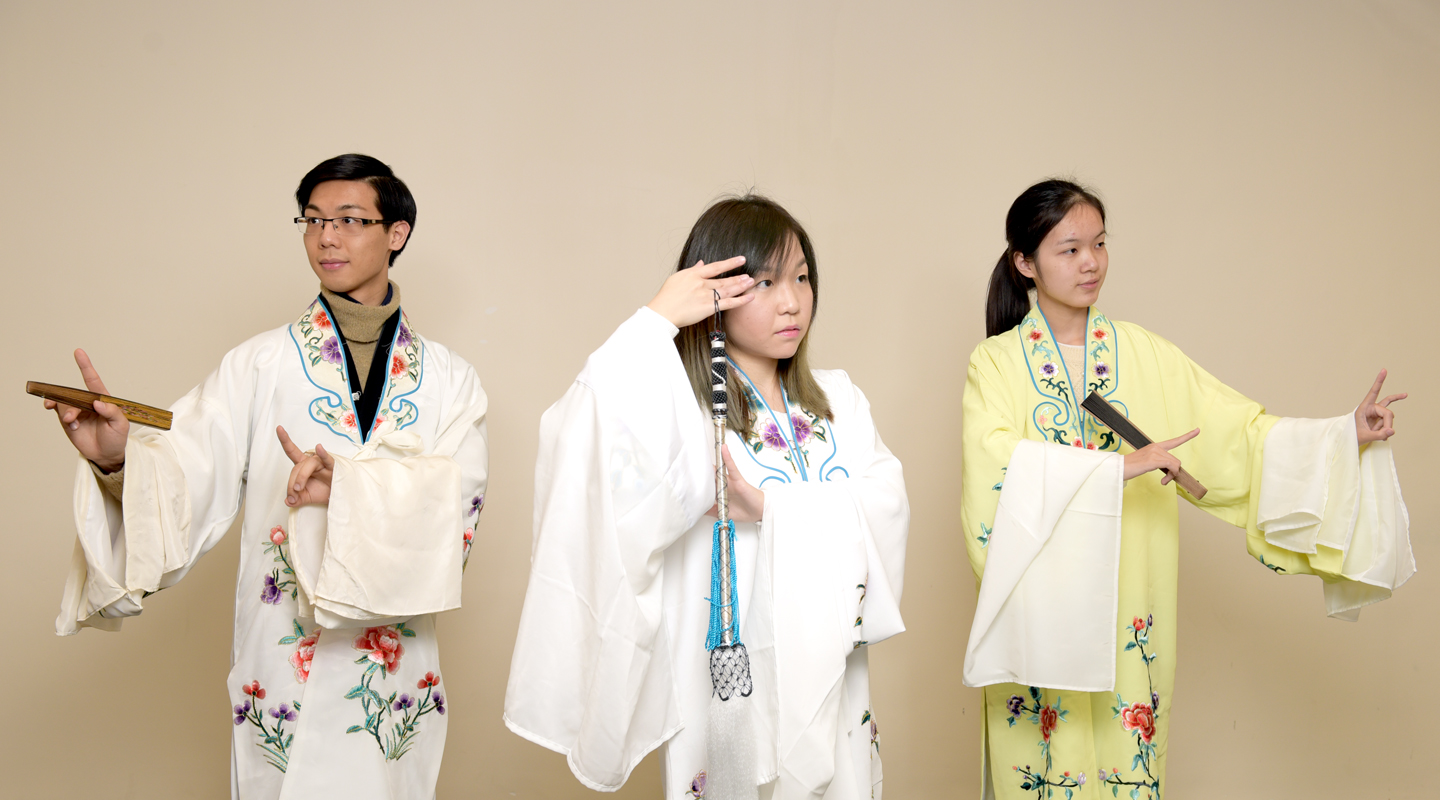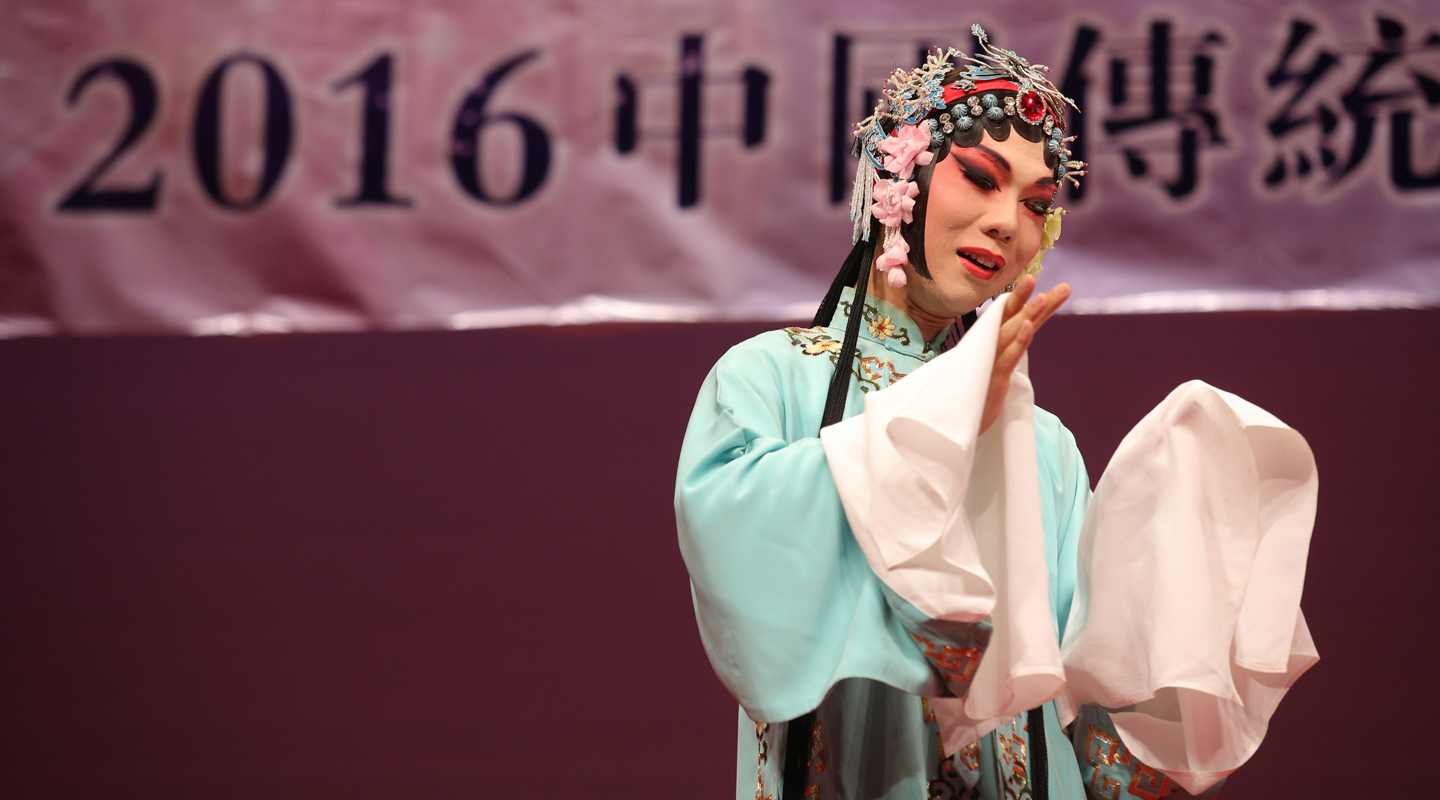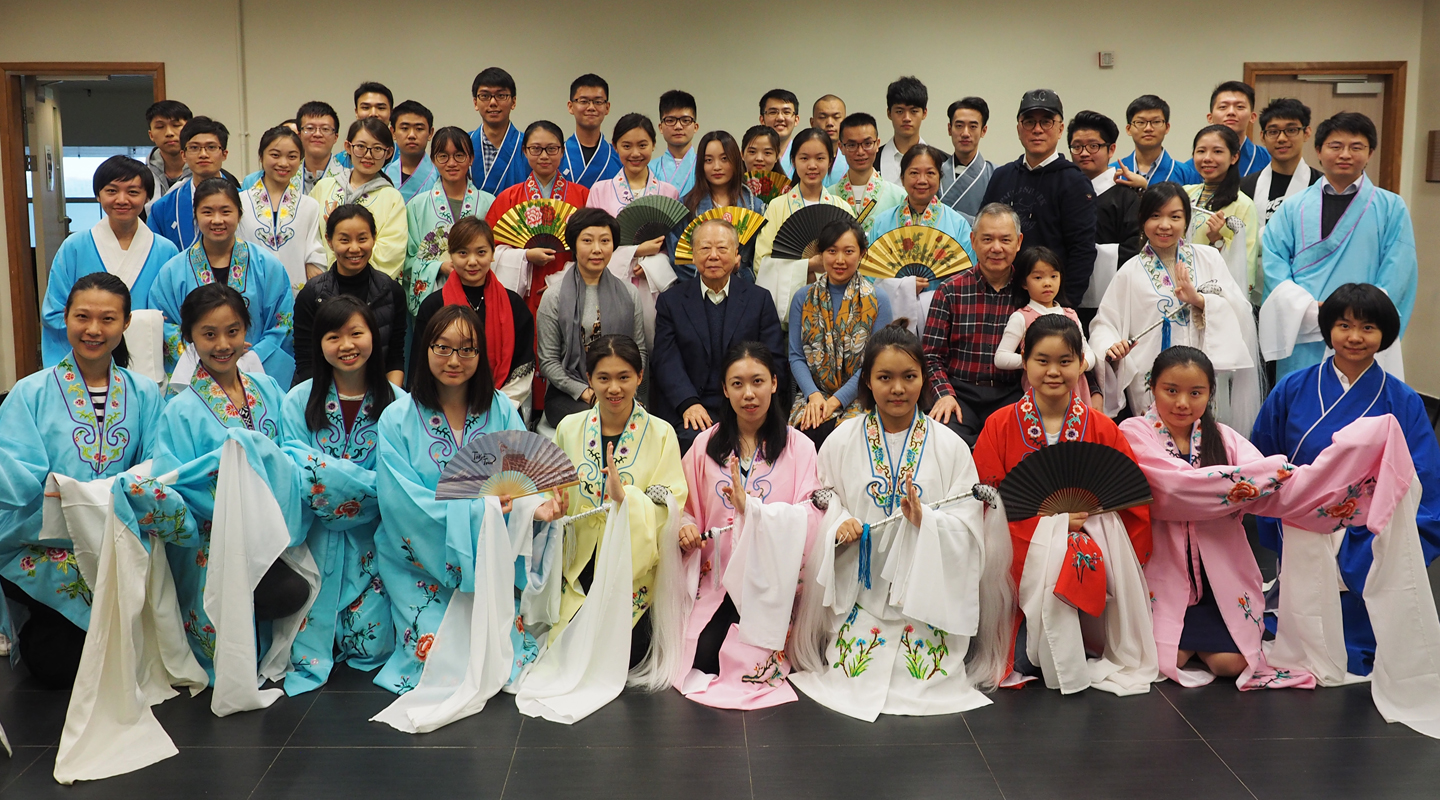To Chinese Opera, with Love

In a mirrored studio at Lee Woo Sing College, several female students in pink, yellow gowns were practising the Peking opera excerpt ‘The Tipsy Concubine’. Ms. Zheng Shuang, a young teacher from the Shanghai Theatre Academy, was shouting by their side: ‘Lift your cheeks!’ ‘Put a spark in your eyes!’ ‘Act like a consort!’ Her sonorous voice belied her overnight train trip to CUHK. It was a Saturday noon late last year, an hour before the performance exam of the course ‘Experience Kunqu and Peking Opera’.
One of the girls ran up to Ms. Zheng, ‘May I go grab a bite for five minutes?’ ‘Of course! Go now!’ Ms. Zheng responded in a pitying tone. A guest student asked, ‘Can guest students also participate in today’s exam and seek your comments?’
This course, fascinating for both students and teachers, is a three-credit elective first launched in 2014, and the first-ever credit-bearing university course on Chinese opera in Hong Kong and in China. Through the Kunqu Opera Promotion Centre founded by College Patron Dr. Lee Woo-sing and member of the Committee of Overseers Dr. Koo Ti-hua, the College collaborated with the Academy to arrange for teachers to come from Shanghai to Hong Kong on a weekly basis to teach the singing and acting of Chinese opera. Although the course is part of the College’s general education scheme, all undergraduate students of CUHK can take it, and any interested person is welcome to sit in.
Singing while Dancing
Ngai Tsz-ching, a Year 3 Chinese medicine student, was attracted to the course by its hands-on aspect. ‘Compared with those classes where you just sit back passively, learning Chinese opera sounded like much fun. Even if I knew nothing about it, I’d love to give it a try.’
Ms. Shi Xiaojun, another teacher from Shanghai, teaches the Kunqu excerpt ‘Yearnings for Earthly Delights’. In this play a young rebellious nun brandishes a horsetail whisk while expressing in song her desire for worldly love and a happy family life. ‘Given that all my eight students had no idea about Kunqu, let alone vocal production, I had psyched myself up to teach all over again after three lessons. Surprisingly, in the fourth class, everyone had learned the voice technique and remembered the poses and moves. I think they are geniuses!’
What Ms. Shi did not see was the hard work her students put in after class. ‘Singing through the throat was drill-intensive, and one easily got out of breath singing and dancing at the same time. It requires repetitive practice to combine them well,’ said Tze-ching. ‘After I got home from school I would practise with my whisk until late into the night. When I woke up the next morning, the first thing coming to my mind was the opera melody!’
Active Learners
Starting from 2016, course participants can opt for a 10-day summer training at the Shanghai Theatre Academy. Kinson Chan, a quantitative finance graduate, was one of the trainees. To race against time, he and another nine students got on a red-eye flight, departing late at night and arriving at the hostel at 2 am. They got up at 7 am and arrived at the rehearsal studio even before it opened.
The training was slated from 9 am to 4 pm. The students called off all the recesses in between. After class they would have a quick meal, and get back to practice until the campus closed at 10 pm. ‘Ten days was a short time. We wanted to make the most of it. Any progress made by a fellow trainee would spur the others to catch up. Everyone was full of zest and energy,’ recalled Kinson.

The Show Must Go On
A highlight of the course is the operatic extravaganza ‘Cha Zi Yan Hong—Traditional Chinese Operatic Arts Promotion Tour’ performed by the course teachers and students together with top actors and actresses. In the 2016 show, Kinson played the female role of Du Liniang in the Kunqu excerpt ‘Interrupted Dream’ from The Peony Pavilion. ‘Before going on stage I was in a cold sweat. My trembling fingers on the long sleeves must be very obvious to the audience.’
Ms. Han Tingting, director of training and performance of the Academy, has been engaged in the curriculum design and teaching since the beginning of the course. She said, ‘On one hand, the show sums up and displays what the course has produced. On the other, it offers a chance for the general public to accept and appreciate the national operatic art.’
Gloria Li, a Year 3 computer science and engineering student, added, ‘When I told my friends I was learning Peking opera, some of them thought it was not cool. I gave them tickets to the show. They loved it and even asked whether they could sit in on my class. We are likely to jump to conclusions before getting to know something. But we need to see it for ourselves to make sound judgements.’
The show has promoted traditional opera as well as the course itself. When the course was in its infancy, the College had feared for the number of enrolment. Unexpectedly, enrolment has risen year by year. Some devotees have attended the course for three consecutive years as they keep coming back even after graduation. In 2017, the spring course drew over 130 applicants, less than 40 of whom were accepted.

Passing It On
Ms. Han opined that the course is valuable for bringing a younger demographic to the ancient art. ‘The biggest challenge faced by Kunqu and Peking opera is ageing audience. If the young people fail to appreciate the art form, why would they pay for the tickets? Students of the course are not training to become professional actors or actresses, but to see the merits of Chinese opera, and to disseminate them to their peers.’
Prof. Joseph Kwong, the College’s Dean of General Education, observed a heightened respect for tradition in the Chinese opera learners. ‘Young people tend to view traditional culture as boring and opaque. Such prejudice stands between them and the beauty of traditional arts, including Chinese opera. The course plays an important role in changing students’ impression on traditional opera by giving them first-hand experience. Experiential learning proves to be an effective way of keeping traditions alive.’
This article was originally published in No. 512, Newsletter in Feb 2018.

